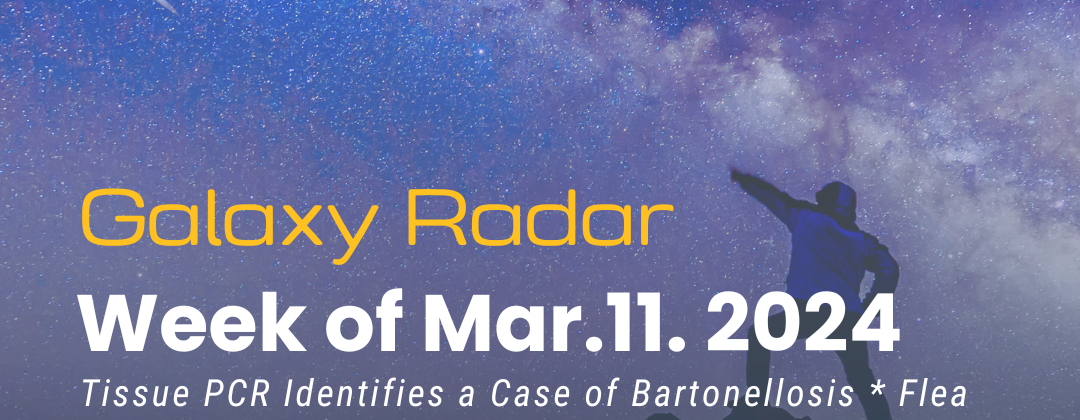Headlines: Tissue PCR Identifies a Case of Bartonellosis * Flea Research from Galaxy Diagnostic Scientists and Others * Warm Winter and an Early Tick Season * More
Tissue PCR Identifies a Case of Bartonellosis
A patient came to the hospital with lymphoproliferative disorder. The man had been a transplant patient for six years, leading to a string of questions: Was it malignancy? Could it have an infectious cause? These questions are explored in Cat-Scratch Disease Masquerading as Post-Transplant Lymphoproliferative Disorder by PBNH Shin et al., publishing from Brisbane, Australia.
The patient tested positive for Epstein-Barr virus, so that could be the answer. A panel of additional serology tests, including Bartonella henselae, was negative. However, the one pathogen-one disease model is outdated, and the first pathogen discovered may not be the entire story. This has been noted in particular with transplant care, where a patient with Epstein-Barr virus may have a malignancy or a further infectious cause. The clinicians continued to look for more information.
A PCR test for Bartonella henselae conducted on a biopsy sample was positive. Many patients with bartonellosis do not have detectable antibodies, especially transplant patients and others on immunosuppressive medications. A combination of serology and direct detection is the most likely method to return accurate diagnostic information. The patient received antibiotics and improved.
Find out more about collecting tissue samples to submit to Galaxy Diagnostics for PCR testing.
Flea Research from Galaxy Diagnostic Scientists and Others
Vector Biology of the Cat Flea Ctenocephalides felis, CO Moore et al., including Galaxy Diagnostics co-founder Dr. Edward B. Breitschwerdt, publishing from the United States, Brazil and Australia – Cat fleas carry pathogens like Bartonella and Rickettsia species but are the subject of almost seven times fewer research articles than ticks. This article discusses research methods applied to vectors like ticks that could also be applied to cat fleas.
New Records of Pathogenic Bacteria in Different Species of Fleas Collected from Domestic and Peridomestic Animals in Spain. A Potential Zoonotic Threat? A Zurita, I Trujillo, and C Cutillas, publishing from the University of Seville – Fleas are expanding their geographic range, moving pathogen exposure into new regions. This study in Spain found five species of fleas carrying pathogens from nine genera including two species of Bartonella: B. henselae and B. clarridgeiae.
Warm Weather and an Early Tick Season
WTOV in Ohio reported on warnings that Ohio has not had a prolonged cold period this winter, leaving ticks active. Residents are warned to use clothing barriers and tick spray to avoid tick-borne disease.
It was a bit colder in Canada, but did you know that ticks carrying Lyme disease may be more resistant to cold than uninfected ticks? Consequently, warnings are going out in Canada too as spring warming brings out active ticks.
More News: Limitations of Powassan Virus Serology * Cacchi-Ricci Disease with Polymicrobial Chronic Infection * Additional Bartonella Headlines * One Health Headlines * Fundraising for The Bartonella Discovery Project * Long COVID Awareness Day* Upcoming Conferences
Limitations of Powassan Virus Serology
Prevalence of Powassan Virus Seropositivity among People with History of Lyme Disease and Non-Lyme Community Controls in the Northeastern United States, T Kapoor et al., publishing from New York, New Jersey and Germany – This study was conducted to determine how many people who had a history of Lyme disease were also seropositive for Powassan virus. Limitations in diagnostic testing for Powassan virus led to the conclusion that studying active infection would be necessary to collect information on incidence.
Cacchi-Ricci Disease with Polymicrobial Chronic Infection
Exploring the Relationship of Supernumerary Recurrent Renal Claculi Formation and Tick-Borne Infections: A Case Study, DC Paz et al., publishing from Colorado and Utah – Patients with Cacchi-Ricci disease often have kidney stones, but this patient had an unusual quantity. Could his chronic infections with Borrelia, Babesia and Bartonella be the cause? The answer isn’t clear, but the authors stress the importance of reviewing evidence for infectious causes.
Find out more about ordering vector-borne pathogen testing from Galaxy Diagnostics.
Additional Bartonella Headlines
Geographically Widespread and Novel Hemotropic Mycoplasmas and Bartonellae in Mexican Free-Tailed Bats and Sympatric North American Bat Species (preprint), DJ Becket et al., publishing from various institutions in the US, Brazil and Germany – For the first time, Bartonella rochalimae, a known pathogen in humans, has been found in a bat. This study of bats in Mexico also found 8 strains of Candidatus Bartonella mayotimonensis.
Apis mellifera Filamentous Virus from a Honey Bee Gut Microbiome Survey in Hungary, M Papp et al., publishing from Hungary – A curious part of the Bartonella story is that there are Bartonella species that seem to be beneficial to bees. In this research, bees with Bartonella species had lower levels of a virus that may be harmful to them.
In 2021, we wrote about the concept of the “pathobiome,” microbiomes that accompany – and may precede – infectious disease.
One Health Headlines
UN One Health Initiative Gets a New Leader – Just two years ago, four UN organizations joined to focus on One Health with a rotating Secretariat. The four organizations are the World Organization for Animal Health, the World Health Organization, the Food and Agriculture Organization of the United Nations and the United Nations Environment Programme. In 2024, the head of the World Organization for Animal Health, Monique Eloit, DVM, takes the lead.
Penn State Undergrads Start a One Health Club – The club brings together students from any major who have an interest in One Health topics. At Galaxy Diagnostics, we are excited to see One Health conversations starting early between future specialists in a diversity of topics. This can only serve to help improve communication between human, animal and environmental health specialists in the future.
Fundraising for The Bartonella Discovery Project
The Global Lyme Alliance is collecting donations to fund The Bartonella Discovery Project. Find out more: https://www.globallymealliance.org/bartonella
Long COVID Awareness Day
March 15th was #LongCOVIDAwarenessDay. Follow the hashtag to hear from people experiencing Long COVID and find out more at https://www.longcovidawareness.life/
Upcoming Conferences
CED Venture Connect – Chief Business Officer Nicole Bell will pitch Galaxy Diagnostics on Thursday, March 21 at 1:45PM and immediately prior to that at 1:00PM will be serving on the Triangle Biotech Panel. Cofounder and CEO Dr. Amanda Elam will also be in attendance.
RESI South 2024 – Cofounder and CEO Dr. Amanda Elam will pitch Galaxy Diagnostics on Monday, March 25 at 4PM.





